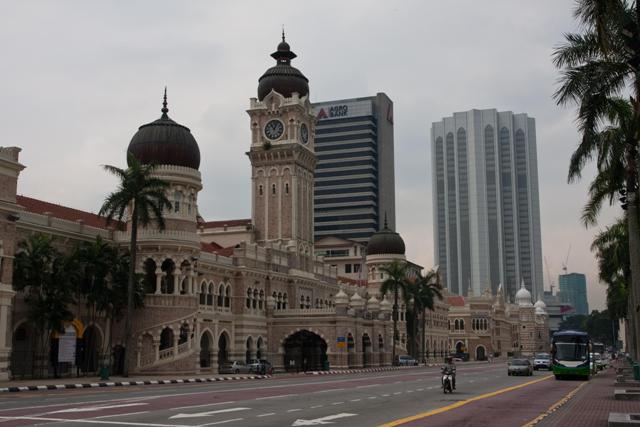 Malaysia's Parliament building. [photo: Alamy]
Malaysia's Parliament building. [photo: Alamy]
[This is an excerpt from an article in The Round Table: The Commonwealth Journal of International Affairs. Opinions expressed do not reflect the position of the Round Table Editorial Board.]
Malaysia is experiencing its deepest crisis since World War II. The country is in the midst of a Covid-19 pandemic, where daily cases exceed 20,000, and daily deaths are in the hundreds. It is being ruled under emergency decree. The suffering evolving from the harsh restrictions is economically and socially costly, and lockdowns have been extended repeatedly due to a bungled vaccine rollout.
More than 30,000 businesses closed permanently last year, with more closing this year. Many families are in a desperate situation; some are even unable to even feed themselves. This has led to the ‘white-flag’ movement, where distressed families have been putting out white flags outside their houses, as a plea for assistance from neighbours.
The suicide rate is rapidly increasing, with 638 cases in the first half of this year, double that of last year. In June this year, GDP saw a 4.4% decline, confirming a downward trend. Official unemployment has risen to 4.8%, although informal sector unemployment has risen much more, where the incidence of poverty is increasing.
The nation is in a deep dissonance. While Malaysians are concerned for their immediate welfare, politicians have been involved in a continual tussle for power. The country has seen three prime ministers over the last 3 years.
Political instability took grip when the opposition Pakatan Harapan (PH) defeated the incumbent Barisan Nasional government, led by the scandal ridden prime minister Najib Razak in 2018. The Malay dominated Barisan Nasional coalition had been in power for 60 years. The change of government generated much hope and excitement from supporters, who saw the possibility of a new era in Malaysia. However, many Malay politicians of the former government found it difficult to accept being out of power.
The Pakatan supporters had been waiting decades for reform. Many thought that former prime minister Mahathir Mohamed joining forces with Pakatan would see him reversing the wrongs he has done in the past. This was not to be. Mahathir, the architect of Islamisation of government, cronyism, and Malay-centric administration, stalled on reform. It had become clear that Mahathir simply used Pakatan as a vehicle to remove Najib from power, along with his Malay-centric Parti Pribumi Bersatu Malaysia (Bersatu).
During the latter part of 2019, there was talk of the Malay parties removing the Chinese-dominated Democratic Action Party (DAP) from power and forming a Malay-unity coalition government. In February 2020, Mahathir suddenly resigned from office, bringing an end to the so-PH experiment and allowing Muhyiddin Yassin to cobble up a Malay-centric government once again, incorporating many members from the defeated Barisan Nasional government.
This brought anger to those who supported Pakatan. The new Muhyiddin government appeared illegitimate to all sides of politics. Political infighting between Bersatu and the United Malays National Organization (UMNO), the dominant party of the old Barisan Nasional, began just as a Covid-19 spike occurred, leading to harsh restrictions across the country. While people could not work, businesses were going bankrupt, and the economy was feeling the effects. Critics argued that Muhyiddin was using Covid-19 to prevent parliament from sitting to avoid a no-confidence motion that would potentially defeat his government.
UMNO was split into two factions, those MPs who supported the Muhyiddin regime and took up posts in the government, and the so-called ‘court cluster’, led by tainted former prime minister Najib Razak and the president of UMNO Ahmad Zahid Hamidi, who himself is facing charges of corruption. Zahid, with control over the party machinery formally withdrew UMNO support for the Muhyiddin government, while UMNO members within Muhyiddin’s cabinet refused to resign, causing an unstable impasse.
At the same time, the Pakatan opposition, now led by Anwar Ibrahim, who was released from jail after the 2018 general election with a pardon, made claims of having the parliamentary numbers to topple Muhyiddin’s government. Other politicians like veteran UMNO MP Tengku Razaleigh Hamzah offered to head a unity government, while Mahathir proposed he could head a National Operations Council with emergency powers.
The political manoeuvring came to a head when besieged prime minister Muhyiddin resigned in August this year, with the king appointing Muhyiddin’s newly appointed deputy prime minister Ismail Sabri Yaakob, as prime minister. This new government just confirmed the return to Malay-centric political dominance.
Murray Hunter is an independent researcher and author in Malaysia.



